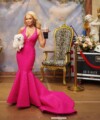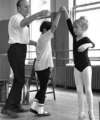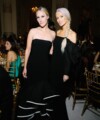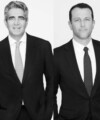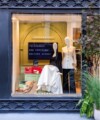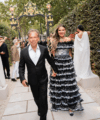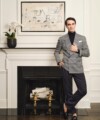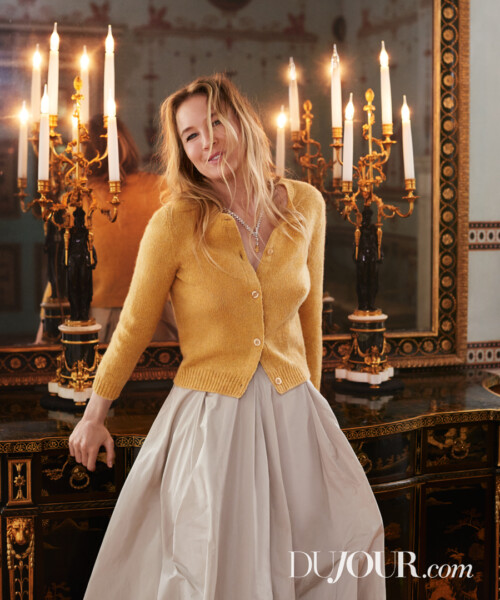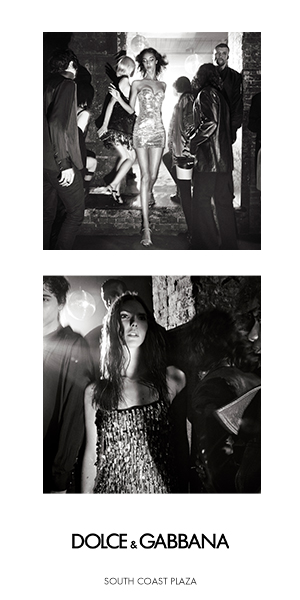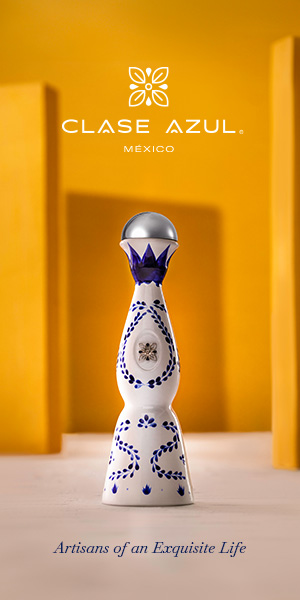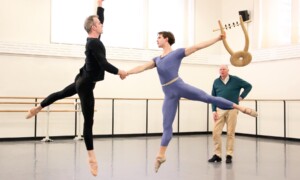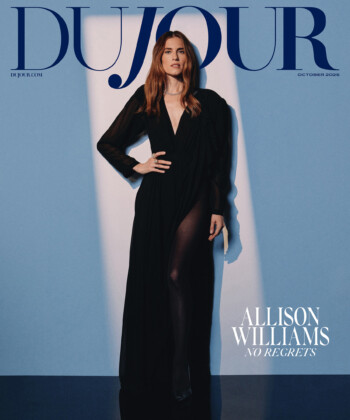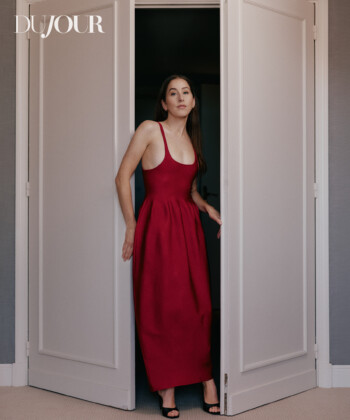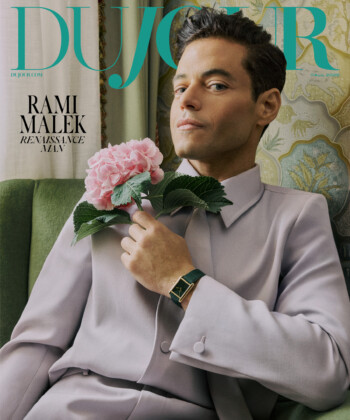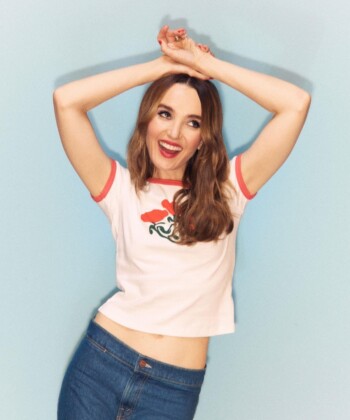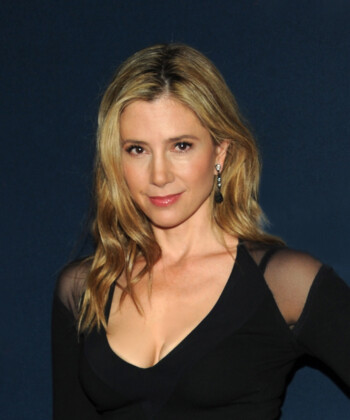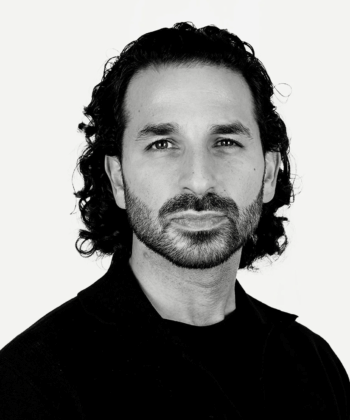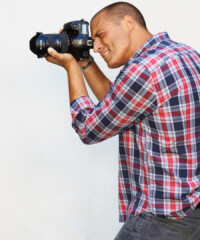A tall, wiry man with round glasses is standing in the palatial lobby of the Getty Center in Los Angeles, the sprawling museum and gardens complex snuggled into the hills of Brentwood. He’s holding an iPad, which he’s suspending feebly toward distracted passersby. He asks if we’d like to take a survey. With brusqueness of New York habit, I say, “No thanks” and breeze past. But Renée Zellweger pauses kindly. “Oh—maybe,” she says, in her whisper-soft Lone Star accent. “Do we get one of those pretty postcards?” Don, as his name card reads, is radiant. Indeed we do! Alas, further investigation unearths that the survey is meant to be taken upon leaving the museum. So we promise to return.
I turn to Zellweger, the well-bred Texas girl who’s just disgraced this one-time Texas girl down to her bluebonnet roots. “So where,” she wants to know, “did your family live in Dallas?”
Zellweger’s hair is pulled up under a baseball cap, with wisps of blonde hair falling in front of her ears. She’s dressed in sneakers with black yoga pants and a black SoulCycle workout jacket, zipped up to the neck. Her skin is a silky buttermilk white: If she spent those idle high school hours slicked up in baby oil and broiling under the suburban sun like the rest of us, you’d be none the wiser now. In fact, it’s doubtful that the teenage Zellweger, a reputed extracurricular queen whose overachieving streak lasted well into her career (as, you know, a movie star), had too many languid afternoons to kill back then. So perhaps in 2010, when she decided to vacate the limelight for a while, she had plans to reclaim a few of those afternoons in the sun.
Regardless, now she’s back. And this September, 15 years after Bridget Jones’s Diary and 11 years after Bridget Jones: The Edge of Reason, we will get the much-anticipated third chapter, Bridget Jones’s Baby. Zellweger, at 47, has returned to play the character for which she received an Academy Award nomination, and for which she is arguably most loved—the aspirational single girl who can be counted on, with cigarette in hand, to slosh wine on the most important person at a party before inadvertently insulting everyone else, all while squeezed into Spanx under a dress that’s just a bit too snug.
Most of the original cast is back, including Bridget’s longtime love interest Mark Darcy, played by Colin Firth, as well as director Sharon Maguire (who sat out the second movie). The notable exception among returnees is Hugh Grant, who played publishing playboy Daniel Cleaver. Those shoes have been filled by Patrick Dempsey, who is very in character as a very American founder of a dating site. Emma Thompson, also a co-writer on the screenplay, is another charming addition, in the role of Bridget’s forthright doctor. The story, based on a series of columns written by Helen Fielding, author of the original Bridget Jones books, centers on a mystery of paternity, after Bridget—now 42 and a successful morning show producer, but single still—has a promiscuous week that results in an unanticipated pregnancy and an unusually high-stakes love triangle.
“Bridget is so true,” Zellweger says of her character while digging through her bag in search of gum, extracting a travel sewing kit and earplugs in the process. “She’s so honest. Whatever it was that Helen experienced and suffered for the rest of us, I’m grateful.”
Another person to whom Zellweger feels indebted is Maguire, who took the chance all those years ago of casting a “Texan comic,” as the British tabloids snidely dubbed her, as Bridget, a character beloved as a national treasure. But Maguire says that she’d seen her in Jerry Maguire and Nurse Betty (two of her biggest roles at that point) and was impressed with her ability to “combine truth and comedy.” So the pair arranged to have dinner. “She had a lovely, self-deprecating quality,” Maguire says, “which isn’t natural to everyone, and was what Bridget needed. She really made me laugh. So I thought, Phew, that’s half my job done.”
In the years following Bridget Jones’s Diary, Zellweger established herself as one of the leading actresses in Hollywood and starred in a procession of big-budget roles, among them her Academy Award-winning performance in Cold Mountain and her Golden Globe-winning performance in Chicago. So much is different now; surely Zellweger herself is different.
“She has changed,” Maguire says. “We were both groping our way, to tell you the truth, with the first one. We didn’t know if it was going to work. But she’s so much more confident now. This one, she just came on and nailed it on the first take, and by the second take, she was trying something different. She is probably one of the most skilled physical-comedy actors I’ve ever come across.” It’s true that it’s hard to think of a character whose body language—that perky, vaguely duck-footed gait, the furrowed brow and mouth slightly agape with concentration—is more endearing. “Bridget herself is made up of a sort of healthy self-loathing combined with a misguided self-certainty,” Maguire says. “Which is, of course, in Renée, and in all of us.”
Zellweger admits to being a bit jet-lagged, just in from a couple weeks of final touches on Bridget Jones’s Baby in London. I tell her I’m curious where she feels most at home, being from Texas, having settled in L.A. and perhaps belonging just a little bit to England, the country having embraced her so warmly as its pop-culture progeny. “I’ve never thought about that,” she says. “I guess I kind of feel at home wherever I go, most places. But I really know I’m home when I go to Texas. My boyfriend is also from Texas and his family is still there, so we go back quite a bit now, which is nice.”
The boyfriend in question is Doyle Bramhall II, the musician, songwriter and producer who’s known for his work with a number of major artists, including Eric Clapton, Elton John and Roger Waters. They’ve been together for about four years, but met when Zellweger was still in college at the University of Texas at Austin. Has it been interesting, I ask, dating an artist from another medium? She smiles. “We’re very compatible.”
Zellweger is famously private, having managed to keep her numerous high-profile relationships over the years—with Jim Carrey, the musician Jack White, an annulled marriage to Kenny Chesney, a two-year stint with Bradley Cooper among them—largely out of the spotlight. And as we’re talking, it strikes me that perhaps her dexterity in obscuring her personal life is a product of her most beguiling quality, which is an apparent curiosity about the minutiae of others’ lives. I mean, we’re talking about an Oscar-winning actress here, but if she’s not genuinely interested it hardly matters because you feel like she totally is. She asks so many questions that—somewhere between learning the hobbies of your four siblings and your favorite cheese and your closeted professional aspirations—it’s easy to forget who’s interviewing whom. Given her plentiful profiles over the past two decades, I know I’m not the first person to feel this way. But I’m curious: What has it been like meeting so many writers over the years, spending time with them and then seeing yourself assembled in their observations?
She laughs. “Someone had me talking to penguins in my own special language at the zoo. But we sat on a bench, we never went to the zoo!”
She’s referring to a Vogue cover story from 1998. I gesture shock. I’d read that story; the part where they “went to the zoo” was a substantial part of the narrative.
“My reaction exactly!” she exclaims. “I don’t know. I guess I have bigger things to worry about. But that’s one of the things I’ve had to learn to make peace with. The truth is…”
“Wobbly?” I suggest.
“It’s wobbly,” she says.
Paradoxically, perhaps now more than ever. “I get excited about the internet because it seems like it should make our culture less naïve about the effects of misinformation,” she continues. “But I still get phone calls from people I’m close to like, ‘Oh my gosh, congratulations!’ The big question is why there is such an appetite for [vicious tabloid coverage]. Snark has somehow replaced intelligent wit, and it’s pervasive… it’s in the political spectrum, it’s everywhere. There’s no shame anymore. It’s an interesting time, and I wonder where the cycle goes from here.”
There is a scene in Bridget Jones’s Baby that seems prescient to our conversation. Bridget finds herself being fired from her job as a morning talk show producer after she has, in a classic Bridget gaffe, mistakenly put a befuddled chauffeur on air to be cross-examined instead of a murderous war general. This comes as the climax to a building conflict with her millennial boss, whose solution to a weighty segment is to air photos of cats that look like Hitler. Bridget launches into an impassioned speech about the integrity of substantive journalism and marches out of the room. It’s an “Ah-ha!” moment of self-emancipation for her, but it leaves the audience feeling a bit despondent—as most soapboxes on this subject can. Bridget is storming out in righteous protest, but the show will go on without her.
By this point, we’ve wandered our way into the Robert Mapplethorpe retrospective, and as our eyes adjust from the California sunshine to the indoor dimness, Mapplethorpe’s shadowy images seem especially lurid. We’re standing in front of a black and white nude of a woman reclining, the expanse of her chalky white torso rushing to meet a tangle of dark pubic hair. Zellweger speaks with unhurried deliberation, foregoing filler words for gaps of silence as she considers her thoughts.
“I guess I just think a lot about this new idea we’re presenting,” she says, “about what you need to do in order to be considered a person of substance in our society. I know I feel overwhelmed by whatever that standard is. Could that be what fuels this need to read negative things about people you don’t know? Or to take out aggression by humiliating people who are in some way recognized for something that they’ve done?”
But in our era of whiplash reactivity, at the exact moment any one person is getting ripped to shreds on Twitter, you can almost hear the tapping of keyboard across America as op-eds are drafted in that person’s defense—the ultimate progression being toward a kind of enforced awareness. Perhaps few have personified this more in recent years than Zellweger herself, although certainly not by her own wishes. It may be ironic that it was at the Elle Women in Hollywood Awards—one of the foremost annual events celebrating and supporting women in her industry—that she made an appearance in 2014 after six years off the grid and generated a hurricane of unusually cruel speculation over her seemingly altered visage. At the time, Zellweger, in model Southern belle form, politely showed the subject to the door. “I’m glad folks think I look different!” she told People magazine. “I’m living a different, happy, more fulfilling life, and I’m thrilled that perhaps it shows.”
Of course, this response—potentially a statement of denial, but most certainly a pointed dismissal of the discussion—was not enough to satiate the carnivores of celebrity gossip. Some came to Zellweger’s defense, mostly with arguments along the lines of “We’ve created a culture that expects women to look younger and then shame them for getting plastic surgery to look younger.” But the fact of the matter is that within the conversation about “aging gracefully,” with its outsized focus on Hollywood actresses, no one really knows how to talk about plastic surgery. Cosmetic plastic surgery is synonymous with vanity, which is synonymous with shallowness, and while we’re all comfortable decrying the pressures to get plastic surgery, once it’s done, to any conspicuous degree, it seems to be viewed as a sort of pitiable surrender. We perceive vanity as operating on a sliding scale, with obsessive exercise, fanatic eating habits and hours spent on makeup contouring and perfecting social media posts on one end—and going under the knife on the other. Being healthy is great, obviously, but if vanity is equivalent to hours spent on the cause of appearance, then surely the equation of “plastic surgery = pitiable vanity” is off. Because really, in this particular feminist cocktail, pity is the poison. It’s the feeling we get when we see a woman who has “overdone it” with plastic surgery—pity that she couldn’t reconcile the changes in her body with our culture’s standard of beauty, and that she cared so much. Because we think women of substance shouldn’t care so much about the way they look.
But none of this is to say that Renée Zellweger got plastic surgery.
So here is where we come to an uncomfortable moment. Having ventured outside again, we are sitting under a shaded enclave with bags of potato chips, and I ask Zellweger her thoughts on Rose McGowan’s recent op-ed for the Hollywood Reporter. The actress had penned a savage defense of Zellweger in response to a column by Variety critic Owen Gleiberman, who, after watching the trailer for Bridget Jones’s Baby, was disappointed that Zellweger, to his mind, no longer looked like the character of Bridget Jones, implicating plastic surgery as the culprit. He then laments our culture for reinforcing an unrealistic beauty standard, and mourns Zellweger—once a “poster girl for the notion that each and every one of us is beautiful in just the way God made us”—as the latest victim of this “cosmetic-zation of reality,” counting Bridget Jones as a related casualty. (Never mind the possibility that Bridget, a middle-aged television producer living on the same planet we do, might herself consider plastic surgery, but I digress.) The internet was flung into a fresh bout of outrage along all the lines one might imagine.
Zellweger, however, has until this moment been unaware of the entire drama. Which puts me in the very unpleasant position of explaining it, and Zellweger in the presumably beyond unpleasant position of hearing about it.
So I fumble through a summary of the main points, a cold sweat pricking at my forehead. Here is a woman who is famous, but who became famous in a time when being famous really did mean something different than it does today. She became famous at a time when the most libelous press she had to worry about was a made-up story about her and some penguins. She’s clearly a deeply intelligent, reflective person who is invested in the state of the world, and as a public figure, she has a greater capacity for impact than the average individual. But it becomes clear, from her reaction in this moment, that for purposes of self-preservation, she is compelled to distance herself from fully engaging with the world as it pertains to her public image. And yet the world knocks; here I am. So Zellweger listens, and pauses for a long moment before responding.
“Well, um, thanks, Rose,” she says, and tells me that she and McGowan “came up together, and that she’s always been very lovely and bright, and involved in important causes.” Then she says very quietly, “But that’s really too bad. He wrote this because he read a tabloid story and it played into his imagination when he watched the trailer? I can’t comment on it because I don’t know specifically what he was talking about, but he’s misinformed. He should have called me.”
But then she does comment, and her voice rises a decibel for the first time in our conversation, the sweet twang of her accent taking on a harder edge. “But I disagree with him, if what he’s talking about is that there can’t be a character who represents every woman at different stages in her life—a character who is flawed, and who represents the truths about our humanity. I don’t know why he thinks there’s no value in that. I see it differently. And I won’t apologize to him for disappointing him that I’ve grown older because that’s the goal.”
She stops and stares into her bag of chips for a moment. She goes on.
“My mom turned 80 in June, and it was a room full of her closest friends. The things they’ve seen—their collective experiences—are invaluable. They’re the winners. Not someone at 26 who was beginning her life as a movie actress and landed a really fun role. He’s an entertainment critic? What does he think of Lucille Ball? Should she have stopped when they went from black and white to color because it wasn’t an ideal representation of that character in his mind? Is that what he’s suggesting?”
[Since this story went to press, Zellweger has published an essay in the Huffington Post, in which she addresses Gleiberman’s article and the rumors of plastic surgery, saying that in the internet era, “choosing the dignity of silence … leaves one vulnerable not only to the usual ridicule, but to having the narrative of one’s life hijacked by those who profiteer from invented scandal… I’m writing because to be fair to myself, I must make some claim on the truths of my life.”]
In the final line of Glieberman’s article, after he insists that he’s always been the biggest Bridget Jones fan, he writes, “I hope it turns out to be a movie about a gloriously ordinary person, rather than someone who looks like she no longer wants to be who she is.”
But seriously, what gloriously ordinary person, at certain moments in their life, hasn’t wished they were someone else? That they looked like or thought like or had the life of someone else? Because where, really, is the glory in being ordinary? Bridget Jones, in all of her “wanton sex goddess” fantasies, wanted precisely not to be ordinary. And each of us, in a society consumed with presenting the least ordinary fantasies of ourselves—living off the feast-or-famine endorphin rush of likes on our best angles and cleverest captions—is petrified of ordinary.
But perhaps the one person who actually does want to live an ordinary life is Renée Zellweger. And she, having concluded her heartfelt monologue, is now jumping around in a very dignified sort of jig (no squealing), with a bee in hot pursuit. I think it’s probably more of a hungry bee than a paparazzi bee, so I pick up her empty chip bag and take it to the trashcan.
“NO, Frances, you can’t be cleaning up my trash!” she cries with surprising force from her bee refuge. We bid adieu to the bee and find Don to take our exit survey, since we did promise. Two girls come up and shyly ask Zellweger for a picture. She agrees genially, even though she tells me afterwards she’s not feeling very photogenic.
“A lot of things feel broken right now,” Zellweger says, as we pass the place we met, the sun lower and gentler now in the late afternoon sky. “But there are also incredible things happening. Women in America are experiencing a cultural renaissance. We’re questioning the pressures that society places on us in terms of expectations for traditional female roles. We’re questioning ideas about body image, ageism. We’re asserting ourselves and recognizing our value. Is that the pendulum swinging? Is that the result of us getting tired of the negativity? Maybe. Maybe we need one to serve as a catalyst for the other.”
It’s true, and in this way, Bridget is still a guiding light—in all of her sloppy, self-respecting, “frankly I’d rather have a job wiping Saddam Hussein’s arse” glory.
Zellweger thinks so. “As much as Bridget fixates on the details, her failures and her successes, I see her as a person who looks outward at the world and not back toward herself. Despite her fixations on certain things, and being embarrassed by her imperfections at times, I like the idea that she’s still free.”


